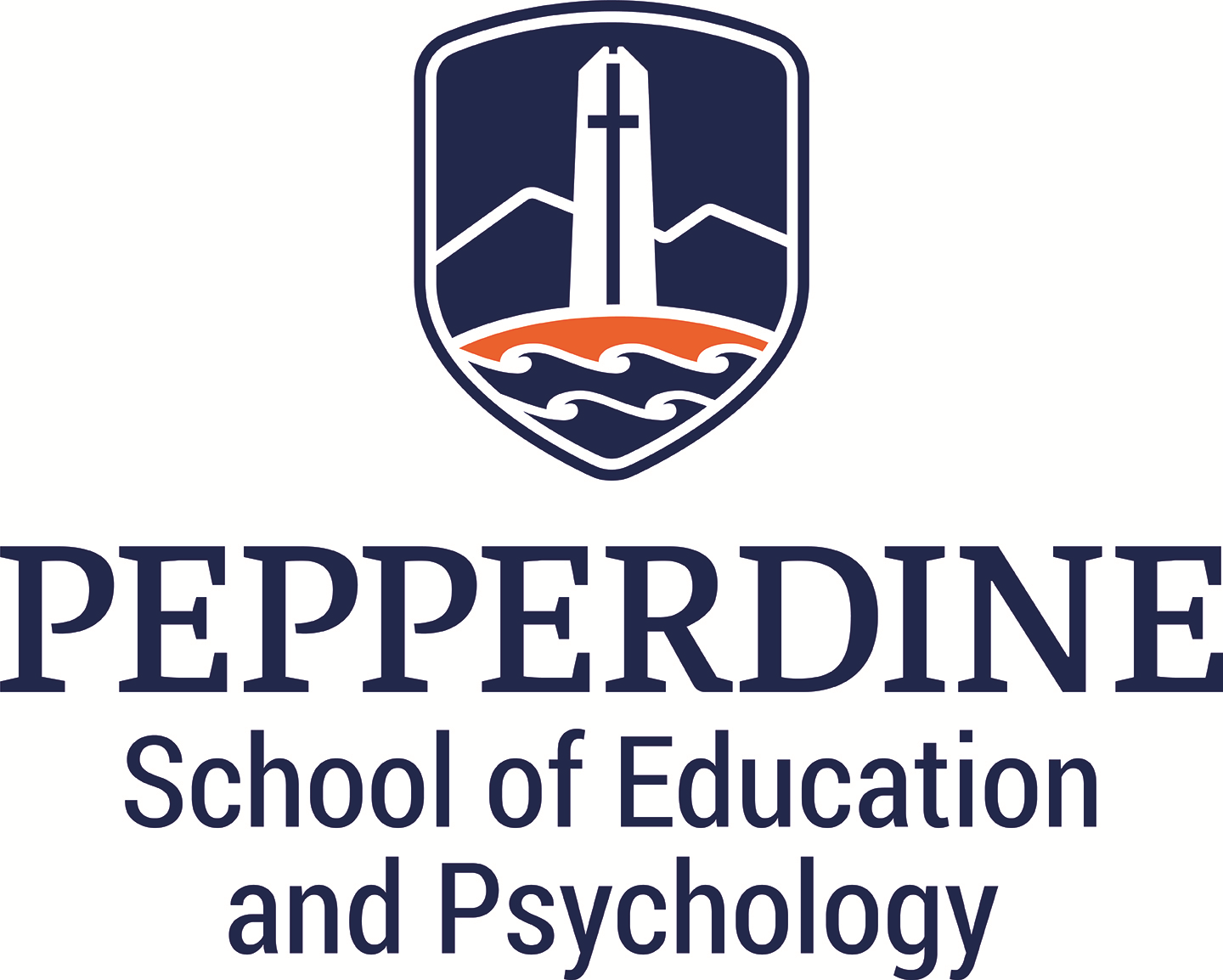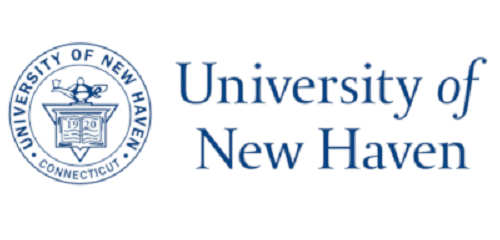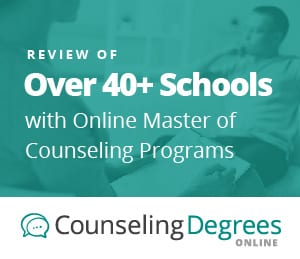 Walden University : MS in School Counseling (CACREP Accredited)
Walden University : MS in School Counseling (CACREP Accredited) Walden University : MS in Clinical Mental Health Counseling (CACREP Accredited, six specializations to choose from)
Walden University : MS in Clinical Mental Health Counseling (CACREP Accredited, six specializations to choose from)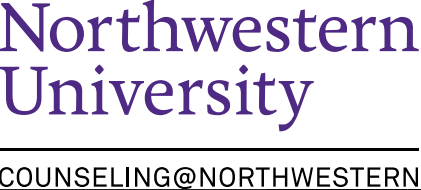 Northwestern University : Online MA in Counseling (CACREP Accredited)
Northwestern University : Online MA in Counseling (CACREP Accredited)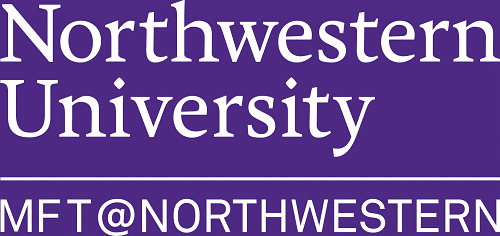 Northwestern University : Master of Science in Marriage and Family Therapy (Complete your COAMFTE-accredited MFT online program in as few as 21 months. No GRE required.)
Northwestern University : Master of Science in Marriage and Family Therapy (Complete your COAMFTE-accredited MFT online program in as few as 21 months. No GRE required.) Grand Canyon University : Bachelor's Degree in Counseling (As a private university, GCU has the same in-state and out-of-state tuition.)
Grand Canyon University : Bachelor's Degree in Counseling (As a private university, GCU has the same in-state and out-of-state tuition.) Grand Canyon University : Master's Degree in Counseling (As a private university, GCU has the same in-state and out-of-state tuition.)
Grand Canyon University : Master's Degree in Counseling (As a private university, GCU has the same in-state and out-of-state tuition.) Liberty University : MA: Clinical Mental Health Counseling (CACREP Accredited) (Online with required intensives)
Liberty University : MA: Clinical Mental Health Counseling (CACREP Accredited) (Online with required intensives)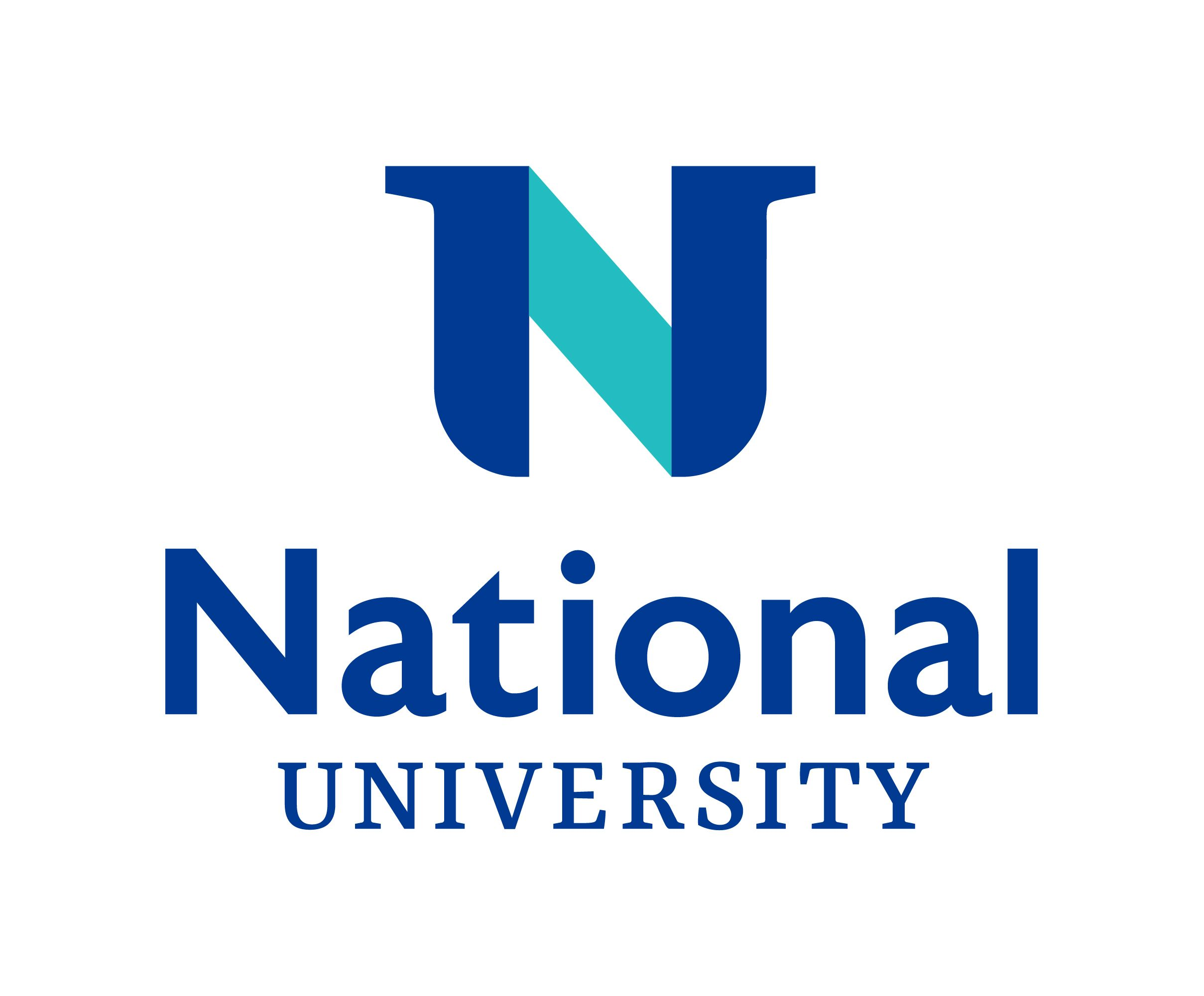 National University : Master of Arts in Marriage and Family Therapy (Accredited. No GRE. Scholarships Available)
National University : Master of Arts in Marriage and Family Therapy (Accredited. No GRE. Scholarships Available)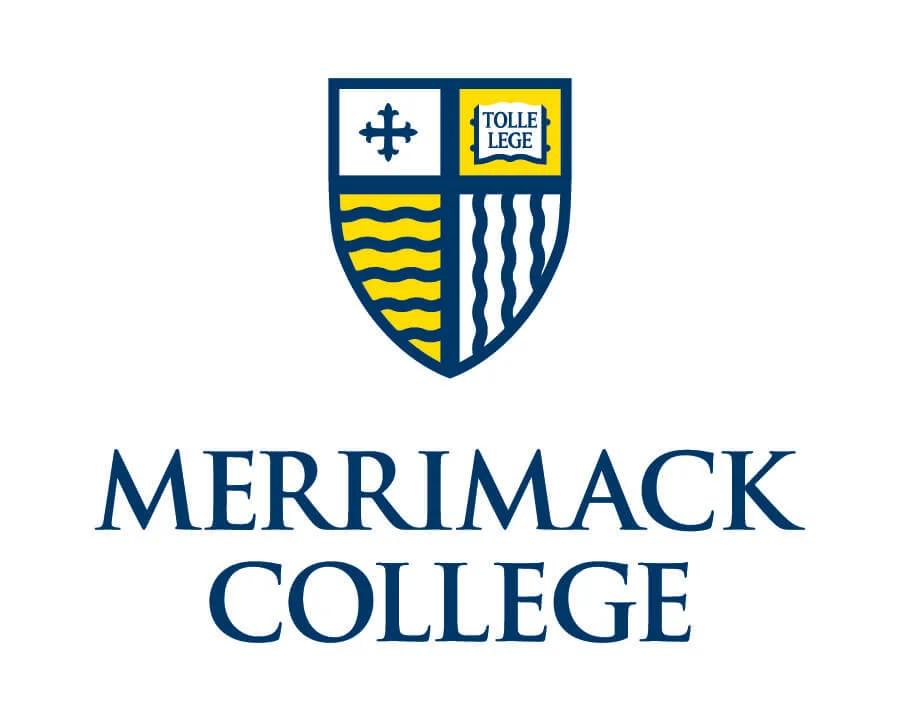 Merrimack College : M.S. in Clinical Mental Health Counseling (Finish in as little as 2 years as a full-time student.)
Merrimack College : M.S. in Clinical Mental Health Counseling (Finish in as little as 2 years as a full-time student.)What Does a Military Counselor Do?
Military counselors work primarily with servicemen and servicewomen who are experiencing difficulties with anxiety, stress, or post-traumatic stress disorder.
These highly trained mental health professionals can be found working alongside military personnel overseas and at military installments across the country, as well as in local mental health organizations and government agencies.
Using specialized techniques, military counselors work directly with military members to establish methods for accepting the loss of friends or comrades during battle, dealing with separation from their families, and healing from physical and emotional wounds.
Military counselors may also work with the families of service members to help them deal with the stress associated with being separated for long periods. In some instances, counselors help military families deal with the death of a loved one. For soldiers who have had long-term effects from trauma, such as substance abuse or intrusive thoughts, military counselors may seek to implement practices such as cognitive behavioral therapy or work to find a therapeutic activity for the individual to become involved with.
Depending on any potential diagnoses, counselors develop a treatment plan aimed at assisting the patient with becoming more open to therapy. The goal is to get the person involved in the treatment, and ultimately, to find a way to gain acceptance and growth throughout the process.
As you decide on the right path for your education, you can remain confident that your work as a military counselor can be extremely beneficial for people who are suffering from stresses related to military service work.
Consider a Featured Online Counseling Program
| School and Program Information | Online Program? Entry Requirements |
Course Information |
|---|---|---|
| Walden University
MS in School Counseling
 CACREP Accredited CACREP Accredited |
✔ Online
GRE scores not required |
School counselors help students overcome obstacles and shape successful futures. Walden’s online MS in School Counseling program will give you a solid foundation in school counseling theories, approaches, and best practices while enabling you to gain hands-on experience. Learn More |
| Walden University
MS in Clinical Mental Health Counseling
 CACREP Accredited CACREP Accredited |
✔ Online
GRE scores not required |
Mental health counselors play a valuable role in helping people cope with life’s challenges. Walden’s online MS in Clinical Mental Health Counseling program can help you become the competent, compassionate counselor you know you can be. Learn More |
| Northwestern University
Online MA in Counseling
 CACREP Accredited CACREP Accredited |
✔ Online
GRE Not Required Bachelor's Required |
Prepare to pursue licensure in as few as 18 months Learn MoreFull-time, part-time, and accelerated track options available |
| Northwestern University
Master of Science in Marriage and Family Therapy
COAMFTE Accredited |
✔ Online
GRE Not Required Bachelor's Required |
The COAMFTE-accredited MFT@Northwestern is offered by The Family Institute at Northwestern University. Full-time students can complete the program in as few as 21 months. No GRE is required, but applicants must hold an undergraduate degree. Full and part-time tracks available. Learn More |
| Grand Canyon University
Bachelor's Degree in Counseling
HLC Accredited |
✔ Online
As a private university, GCU has the same in-state and out-of-state tuition. |
Programs include BS in Counseling with an Emphasis in Addiction, Chemical Dependency, and Substance Abuse; BS in Psychology; and BS in Behavioral Health Science. Learn More |
| Grand Canyon University
Master's Degree in Counseling
HLC and NASAC Accredited |
✔ Online
|
Clinical Mental Health Counseling master's degree emphases include: Childhood and Adolescence Disorders, Christian Counseling, Marriage and Family Therapy, and Trauma. Designed to meet the academic requirements of the National Board for Certified Counselors for the National Certified Counselor credential, the Certified Clinical Mental Health Counselor credential and the Arizona Board of Behavioral Health Examiners. As a private university, GCU has the same in-state and out-of-state tuition. Learn More |
| Liberty University
MA: Clinical Mental Health Counseling (CACREP Accredited)
 CACREP Accredited CACREP Accredited |
✔ Online
Online with required intensives |
Our CACREP-accredited master’s in counseling degree online can help you become an ethical, well-trained mental health counselor with the knowledge, values, and skills you need to empower others to make positive changes in their lives. Online and on campus. Training Champions for Christ since 1971. Learn More |
| National University
Master of Arts in Marriage and Family Therapy
COAMFTE Accredited |
✔ Online
GRE Scores Not Required |
Earn your masters in Marriage and Family Therapy at National University. COAMFTE and IACSTE accredited. Learn More |
| Merrimack College
M.S. in Clinical Mental Health Counseling
|
✔ Online
NECHE-Accredited | Aligns with CACREP standards |
Take the next step in becoming a Licensed Mental Health Counselor today with an M.S. in Clinical Mental Health Counseling from Merrimack College. Channel your passion for helping people with a rewarding career in mental health with our M.S, in Clinical Mental Health Counseling in as short as 2 years. Learn More |
*Sponsored Counseling Programs
Online CACREP Accredited programs | Online MPCAC Accredited programs
Military Counseling Degree Programs
Numerous educational programs are available in an online setting, which allows you to more easily take part in an exciting degree program and provide yourself with a great career. The purpose of this guide is to educate you further on what’s required to pursue a career in this field and detail the steps you can take to become part of it.
Acquiring the education and experience needed to become a military counselor will enable you to make a difference in the lives of those who sacrifice their safety to make our country a safer place to live.
Through extensive educational involvement and specific coursework that focuses on the effects of being in the military, you can learn just how effective counseling can be.
Common Education Requirements to Become a Military Counselor
The first step in becoming a military counselor is to obtain an education. This specialized field requires that you gain knowledge in areas such as psychology, counseling, and the military in general.
Some degree programs are designed to implement all of these requirements, but in other cases, you may need to obtain the minimum requirement of a master's degree in counseling or psychology as well as a post-master’s certificate in military counseling.
The steps for becoming a licensed military counselor are listed below.
Bachelor’s Degree in Military Counseling
The first step for anyone seeking licensure as a counselor is to earn a bachelor’s degree. Depending on your interests, you may find either the bachelor’s in psychology or counseling suitable.
Each program is designed to implement the theory and practice of mental health intervention, alongside the general education requirements for all bachelor’s programs. During this experience, you’ll begin with standard, general education courses such as math and science, followed by courses in psychology and counseling.
The purpose of the general education requirement is to test your competencies in standard educational subjects before delving into the more concentrated nature of graduate-level programs. Most full-time students find they can complete a bachelor’s degree in four years.
Military Psychology Master’s Programs
Most military psychology master’s programs require that students take the GRE before being accepted. The scores from this exam are sent to the colleges that you apply to in order to help them determine your intellectual standing.
Once you’ve been accepted into a master’s program, you can choose majors that focus on counseling or psychology as a primary means for your training. Some colleges offer master’s level degrees in military counseling but it may be more beneficial to obtain a generic counseling degree and complement it with a graduate certificate.
Military psychology graduate programs last anywhere from one to two years, and many can be completed entirely online. During this program, you may be expected to take part in standardized tests, class discussions, and case studies and projects that allow you to test your skills in counseling.
Certificate Programs
Certificate programs were implemented to give students who’ve completed a military psychology master’s program more experience in specific genres of their choice. Military counseling requires that students have extensive knowledge of the U.S. military, the loss and tragedy associated with war, and the effects that these experiences can have on service members and their families.
Certificate programs that specialize in military counseling can be completed in approximately one year. If you’re interested in taking this route, there are certificate programs in military counseling available online.
Experience and Licensure
All degree programs in counseling that lead to licensure include a supervised work experience requirement. In online degree programs, you may be expected to locate a licensed professional counselor close to you who you can work under. This experience includes taking part in real-life counseling sessions and observing a licensed counselor as they go about their daily routine.
Through this requirement, you can gain a better understanding of what to expect while working in the field and learn how to transition your educational knowledge to a real-world environment. This requirement typically necessitates working in a supervised environment for one to two years, depending on your state’s counseling licensure requirements.
Once this has been completed, you can apply to take your state’s board exam in counseling and obtain your license to practice.
 Walden University - MS in School Counseling (CACREP Accredited)
Walden University - MS in School Counseling (CACREP Accredited)
 Walden University - MS in Clinical Mental Health Counseling (CACREP Accredited)
Walden University - MS in Clinical Mental Health Counseling (CACREP Accredited)
 Northwestern University - Online MA in Counseling (CACREP Accredited)
Northwestern University - Online MA in Counseling (CACREP Accredited)
 Northwestern University - Master of Science in Marriage and Family Therapy (COAMFTE Accredited)
Northwestern University - Master of Science in Marriage and Family Therapy (COAMFTE Accredited)
 Grand Canyon University - Bachelor's Degree in Counseling (HLC Accredited)
Grand Canyon University - Bachelor's Degree in Counseling (HLC Accredited)
 Grand Canyon University - Master's Degree in Counseling (NASAC Accredited)
Grand Canyon University - Master's Degree in Counseling (NASAC Accredited)
 Liberty University - MA: Clinical Mental Health Counseling (CACREP Accredited) (CACREP Accredited)
Liberty University - MA: Clinical Mental Health Counseling (CACREP Accredited) (CACREP Accredited)
 National University - Master of Arts in Marriage and Family Therapy (COAMFTE Accredited)
National University - Master of Arts in Marriage and Family Therapy (COAMFTE Accredited)
 Merrimack College - M.S. in Clinical Mental Health Counseling (NECHE Accredited)
Merrimack College - M.S. in Clinical Mental Health Counseling (NECHE Accredited)
Common Coursework in a Military Counselor Program
Once you’ve decided to move forward with a degree program in counseling or military counseling, you may find that the coursework is representative of the assessment, treatment, and care of those serving in the U.S. military.
The coursework in these programs may mirror what’s required for standard counseling programs, with the addition of specific classes that teach the history and effects of military service.
You may also take courses that allow you to explore how military family life counselors can help service members’ families. For example, serving in the military can have a secondhand effect on military service members’ spouses and children. Taking coursework in this area can contribute to your understanding of emotional turmoil within the family unit.
Sample courses that are common in these degree programs are discussed below.
Working with Military Spouses, Families, and Children
This course seeks to educate students on the ways that being in the military can influence the family life of servicemen and servicewomen. Military members and families are subjected to living in many new environments, being separated for long periods, and potentially suffering from loss or injury. Therapeutic techniques for family members are covered in detail in this course.
Techniques in Counseling
Students taking this course may be asked to consider their own biases and opinions about mental health as a means for better understanding counseling.
Skills in the initial assessment process are taught, as well as the ethical considerations of counseling techniques. This course allows students to take part in studies surrounding observational data, the interpretation of data, and writing conclusive reports.
Diagnosis and Assessment
This course is designed to help students identify different psychological components that are descriptive of mental illness and disorders. Using diagnostic criteria, students may have the opportunity to apply their knowledge to fictional and real-life case studies.
The use of diagnostics in counseling is profound, making this course exceptionally important for those pursuing a career in military counseling.
Benefits of Working as a Military Family Life Counselor
The most important role of a military family life counselor is to provide counseling services to spouses and families of active-duty service members who are serving in the U.S. Army, Navy, Air Force, Marines, Coast Guard, or National Guard.
Professionals who work in this specialized family counseling field are taught how to provide nonmedical counseling services designed to help their clients cope with various stressors associated with military life.
Through their work, military family life counselors are often gratified to know they’re able to help empower military families to navigate complex issues and challenges.
Schools and Programs to Consider
When you’re seeking a school for your undergraduate degree (or if you’re researching military psychology graduate programs), you may find many options with slight differences.
Different programs provide different tracks and specializations, so it’s important to determine what you desire for your degree. If you’re seeking a master’s degree that focuses primarily on military counseling, numerous universities offer this program online.
For others, it may be more beneficial to obtain a post-master’s certificate after completing a master’s degree in counseling or psychology from another university. Some of the schools offering these programs include:
Walden University – Online MS in Clinical Mental Health Counseling – Military Families and Culture
Walden University’s online MS in Clinical Mental Health Counseling encompasses mental health counseling as a whole with the addition of the Military Families and Culture specialization. Most students find they can complete this program in two to three years, and the study track allows students to graduate with a general clinical mental health counseling degree and a specialization in military treatment.
Program coursework — which includes classes such as multicultural counseling; military culture; and working with military spouses, families, and children — is designed to increase students’ knowledge and skills in general mental health counseling.
Further, the coursework has been designed to provide graduates with a deep understanding of the various treatment methods and therapeutic processes used with individuals suffering from a wide range of mental illnesses and emotional difficulties.
Adler University – Online MA in Psychology – Military Psychology
This online military psychology graduate program at Adler University understands the importance of increasing support for military members and their families. The entire program consists of 37 credit hours and includes classes such as culture and diversity in the military, the continuum of care for the military, veterans and their families, and the psychology of terrorism.
Most students find they can complete the coursework in a little over two years. Throughout the program, students are taught how being in the military and participating in active combat affect those involved.
Methods for resiliency and healing may be taught in this program, providing students with a stable foundation for successful practices in the future.
William and Mary – Clinical Mental Health & Military and Veterans Counseling – M. Ed.
The CACREP-accredited M.Ed. program at the William and Mary School of Education prepares students to address the unique behavioral health needs of active-duty military and military veterans.
Offered online or on campus, this 60-credit hour program can be completed part time in as few as three years. The broad curriculum includes classes such as military-to-veteran transition, assessment and treatment of trauma-related disorder, and addiction counseling; it also includes internship experiences.
Graduates of this program often find they’re well prepared to engage in effective counseling relationships with active-duty military, veterans, and their families.
Military Counselor Salary and Career Outlook
Becoming a military counselor can be a fulfilling and helpful decision not only for you but for those who rely on you. If you plan on pursuing a career in this field, you could work on military installations, providing proximity care for the service members in the area.
There are numerous vacancies for mental health care professionals who want to help soldiers manage their feelings regarding separation, war, deployment, and general life stresses. Some military counselors work in community settings, providing help to veterans who want to lead normal civilian lives.
Other entities that seek the expertise of mental health counselors include colleges, mental health organizations, and the government. As a professional in this field, you can work with youth who are seeking careers in the military, college students who are considering the military for their future, current military professionals and their families, and veterans who are no longer actively involved in the military.
The U.S. Bureau of Labor Statistics (BLS) considers counselors of all disciplines when compiling its yearly statistics. The BLS estimates that the median annual salary for counselors was $42,930 as of May 2019; the top 10% earned an estimated $77,590. These numbers can change drastically depending on the field in which you work, where you work, and how much experience you have working with military members.
Become a Military Counselor
Providing the resources and tools to help members of the military community dealing with stress, anxiety, and other mental health issues live happy, healthy lives can be a rewarding career. That’s especially the case when helping U.S. military members and their families. As a military counselor, you can use your skills and experience to provide this valuable help while pursuing a variety of career opportunities and earning a good salary.




